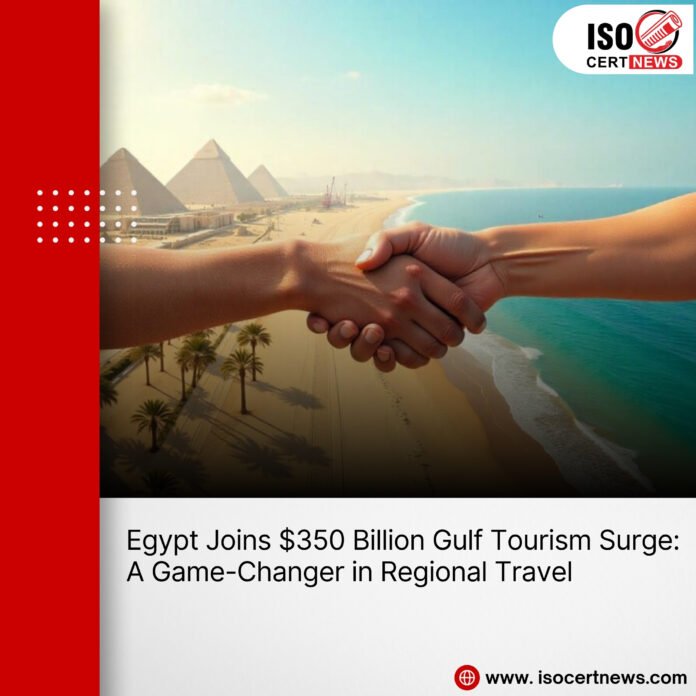Egypt is making bold moves—and it’s doing so alongside powerful partners. In a historic $350 billion push, Egypt has teamed up with Saudi Arabia, the UAE, Qatar, and Bahrain to launch one of the largest tourism investment waves the Middle East and Africa have ever seen.
This isn’t just a strategic alliance. It’s a transformative step that’s set to reshape the entire region’s travel and infrastructure landscape. The goal? To turn ancient landmarks and untouched coastlines into world-class destinations and economic powerhouses.
A $350 Billion Vision for the Future of Travel
Tourism across the Middle East is experiencing a renaissance—and Egypt is now at the heart of it. The five-nation collaboration is injecting $350 billion into mega tourism projects, infrastructure upgrades, and investment reforms aimed at drawing millions more visitors while creating hundreds of thousands of jobs.
In 2024, Egypt welcomed 15.78 million tourists—a 6% increase from the previous year and 21% above pre-COVID levels. But the country isn’t just bouncing back—it’s reaching for something bigger: long-term tourism leadership across the region.
From cutting-edge resort cities to fast-track investment permits, Egypt is aligning with Gulf nations to deliver a new era of travel—and the results are already taking shape.
Ras El Hekma and Ras Gamila: Coastal Megaprojects Redefining Luxury
Leading this charge is Ras El Hekma, a $35 billion coastal development on the Mediterranean led by UAE’s ADQ. This futuristic destination blends luxury resorts, finance hubs, and sleek marinas—set to rival Dubai and Saudi Arabia’s NEOM.
At the same time, Saudi Arabia is investing in Ras Gamila, a high-potential site near Sharm El-Sheikh. The vision? A luxurious, climate-smart corridor connecting Egypt’s Red Sea coast with Saudi Arabia’s mega-projects, offering seamless, multi-country travel experiences.
These projects aren’t just about tourism—they’re symbols of a deeper economic integration between Egypt and the Gulf. Together, these nations are shaping a shared future, combining capital, planning expertise, and a clear strategic vision.
Egypt Opens the Door Wider with Golden Licenses and Investment Reforms
To keep momentum building, Egypt has introduced sweeping reforms designed to attract foreign investors. Its “Golden License” initiative speeds up project approvals, slashes bureaucracy, and offers significant advantages for investors.
Add to that a revamped citizenship-by-investment program, and it’s clear: Egypt is rolling out the red carpet for Gulf capital and global entrepreneurs.
These efforts align with Egypt’s Vision 2030, a blueprint to modernize the economy, expand infrastructure, and secure long-term growth through foreign direct investment. And it’s working—Qatar alone has committed $7.5 billion for 2025, with billions more planned through 2027. Bahrain is boosting flight routes and easing customs to smooth the flow of travelers and trade.
Hotel Crunch Drives Policy Shifts and New Opportunities
As tourist numbers rise fast, Egypt’s hotel capacity is under pressure. In response, the government has introduced flexible short-term rental policies to support a growing vacation-home market.
This strategy not only relieves the strain on hotels, but also opens up income opportunities for locals and offers more lodging choices for travelers—especially those seeking unique or longer stays.
With major infrastructure upgrades underway, Egypt is planning to double its tourist capacity to 30 million by 2028—a move that would position it as a global top-tier destination.
Gulf Partnerships Strengthen Egypt’s Economic Core
This deepening partnership with Gulf nations is no accident. As Saudi Arabia, the UAE, and Qatar look to diversify beyond oil, Egypt offers a strategic location, rich cultural assets, and access to both the Red Sea and the Mediterranean.
What Gulf investors bring isn’t just money—it’s expertise, innovation, and proven planning models. From Dubai’s global appeal to NEOM’s ambitious blueprint, Gulf nations have the know-how to create next-gen tourism ecosystems. And now, Egypt is becoming part of that vision.
In turn, Egypt gains greater economic resilience. With ongoing inflation and currency challenges, foreign investments help stabilize the Egyptian pound, support public budgets, and fund critical development projects.
A New Tourism Map: What’s Changing Now
The impacts of this regional tourism alliance are already being felt:
Tourism growth: Annual visitor numbers are expected to grow by 18% over the next four years.
Jobs boom: Tens of thousands of new roles are emerging in hospitality, transport, and tourism services.
Cultural uplift: Icons like the Grand Egyptian Museum will benefit from better access and larger crowds.
Seamless travel: Improved air links and shared visa pathways are unlocking easy, multi-country itineraries.
In short, Egypt is fast becoming not just a destination, but a tourism hub connecting Africa, Asia, and Europe.
Challenges to Watch
Still, the path forward comes with hurdles. Public debt remains high, and critics warn that fast-tracking mega-projects could sideline local needs. There are also questions about sovereignty and transparency, especially as more land and assets are offered to foreign investors.
Currency volatility adds risk, and while Gulf money helps in the short term, Egypt must build a sustainable, diversified base to avoid long-term dependency.
But despite these concerns, the overall momentum is strong—and the opportunity is massive.
The Takeaway: Egypt Takes the Lead in Regional Travel Revolution
With Ras El Hekma rising from the Mediterranean, Ras Gamila opening the door to cross-border luxury, and billions pouring in from its Gulf allies, Egypt is no longer watching the region’s transformation from the sidelines—it’s driving it.
By embracing investment, unlocking policy barriers, and modernizing its infrastructure, Egypt is setting a bold course toward becoming a tourism powerhouse.
As global travelers look to discover new destinations—from Nile cruises to desert escapes to futuristic resort cities—Egypt is ready to welcome the world.
This is more than tourism. It’s Egypt’s gateway to growth, influence, and global recognition.
source – https://www.travelandtourworld.com/news/article/egypt-joins-forces-with-saudi-arabia-uae-qatar-and-bahrain-in-three-fifty-billion-usd-tourism-power-surge-skyrocketing-travel-infrastructure-new-update-you-need-to-know/










